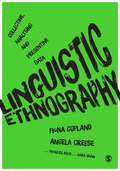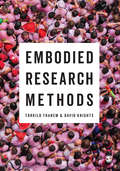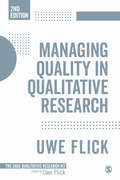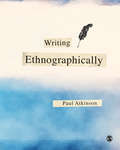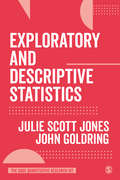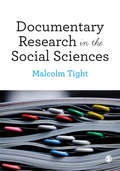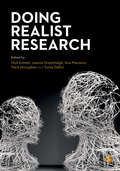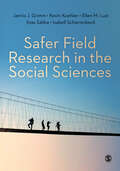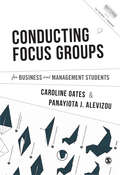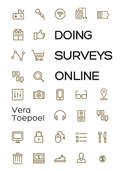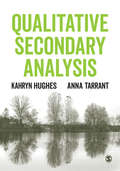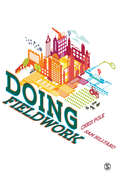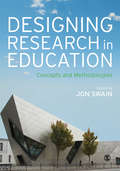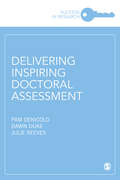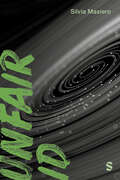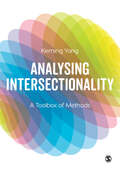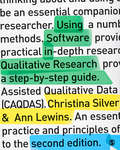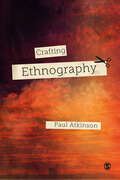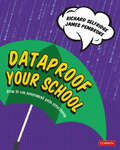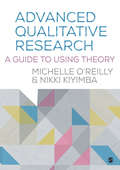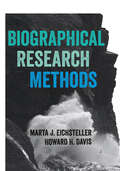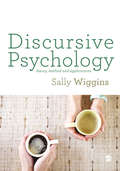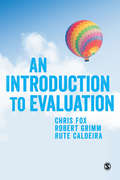- Table View
- List View
Linguistic Ethnography: Collecting, Analysing and Presenting Data (Palgrave Advances In Language And Linguistics Ser.)
by Fiona Copland Angela CreeseThis is an engaging interdisciplinary guide to the unique role of language within ethnography. The book provides a philosophical overview of the field alongside practical support for designing and developing your own ethnographic research. It demonstrates how to build and develop arguments and engages with practical issues such as ethics, transcription and impact. There are chapter-long case studies based on real research that will explain key themes and help you create and analyse your own linguistic data. Drawing on the authors’ experience they outline the practical, epistemological and theoretical decisions that researchers must take when planning and carrying out their studies. Other key features include: A clear introduction to discourse analytic traditions Tips on how to produce effective field notes Guidance on how to manage interview and conversational data Advice on writing linguistic ethnographies for different audiences Annotated suggestions for further reading Full glossary This book is a master class in understanding linguistic ethnography, it will of interest to anyone conducting field research across the social sciences.
Embodied Research Methods
by David Knights Torkild ThanemDisembodied research erects false dichotomies between flesh and reason, and between the corporeal and the social. By contrast, Torkild Thanem and David Knights engage with approaches and practices that exploit the body’s capacity to generate knowledge, craft lively accounts, and create fleshy concepts. These approaches enrich our understanding of how people live, work, and interact with their bodies within the social world. Thanem and Knights discuss methods, practices, and personal experiences which involve bodies in the research process – in generating and analysing empirical material, reflecting on the work they do as researchers, and turning research into written text. Embodied Research Methods is an important and practical resource for undergraduate and postgraduate students across the social sciences, and a thought-provoking read for researchers in these areas.
Managing Quality in Qualitative Research (Qualitative Research Kit #10)
by Uwe FlickQuality underpins the success (or failure) of any piece of qualitative research. In this book, Uwe Flick takes you through the steps in method and design to ensure quality and reliability throughout the entire research process. Showing hands-on what it means to ′manage′ quality, this book puts the spotlight on practical questions and steps researchers can use to continually interrogate, improve and demonstrate quality in your research.
Writing Ethnographically (Super Quick Skills)
by Paul AtkinsonThis original and authoritative exploration of ethnographic writing comes from one of the world′s leading academics in the field, Paul Atkinson. The third book in his seminal quartet on ethnographic research, it provides thoughtful, reflective guidance on a crucial skill that is often difficult to master. Informed throughout by extracts from Paul’s own writing, this book explores and examines a broad range of types and genres of ethnographic writing, from fieldnotes and ‘confessions’, to conventional ‘realist’ writing and more. Whilst highlighting the possibilities and implications of ethnographic text, this valuable resource will help those conducting ethnographic research select and adopt the most appropriate approach for their study.
Exploratory and Descriptive Statistics (The SAGE Quantitative Research Kit)
by Julie Scott Jones GoldringNervous about statistics? This guide offers you a clear, straight to the point break down of exploratory and descriptive statistics and its potential. Anchored by lots of examples and exercises to enhance your learning, this book will give you the know-how and confidence needed to succeed on your quantitative research journey.
Documentary Research in the Social Sciences
by Malcolm TightFrom diaries and letters to surveys and interview transcripts, documents are a cornerstone of social science research. This book guides you through the documentary research process, from choosing the best research design, through data collection and analysis, to publishing and sharing research findings. Using extensive case studies and examples, it situates documentary research within a current context and empowers you to use this method to meet new challenges like digital research and big data head on. In a jargon-free style perfect for beginner researchers, this book helps you to: · Interrogate documentary material in meaningful ways · Choose the best research design for your project, from literature reviews to policy research · Understand a range of approaches, including quantitative, qualitative and mixed methods. Accessible, clear and focused, this book gives you the tools to conduct your own documentary research and celebrates the importance of documentary analysis across the social sciences.
Doing Realist Research
by Nick Emmel Joanne Greenhalgh Ana Manzano Mark Monaghan Sonia DalkinBringing together leading theorists, researchers and policy makers with expertise in using realist methods, this book is a definitive guide to putting realist methodologies into practice. Not just an overview of the field, this book looks to extend current debates and apply realist methods to new and practical challenges in social research. Featuring practical, worked examples of how to turn theory into evidence, it empowers readers not just to understand realist methods, but to use them. It will help readers: - Negotiate the complexity of relational systems - Understand the importance and relevance of cumulative theory - Address concerns over data sources and quality - Be flexible and creative in realist approaches - Produce useful evidence for policy. Sophisticated and globally minded, this book is the perfect addition to the ongoing development and application of realist methods across evaluation, synthesis, and social research.
Safer Field Research in the Social Sciences: A Guide to Human and Digital Security in Hostile Environments
by Isabell Schierenbeck Jannis J. Grimm Kevin Koehler Ilyas Saliba Ellen M. LustExploring the challenges and risks of social science fieldwork, this book shares best practice for conducting research in hostile environments and pragmatic advice to help you make good decisions. Drawing on the authors’ experiences in regions of conflict and grounded in real-world examples, the book: · Provides practical guidance on important considerations like choosing a research question in sensitive contexts · Gives advice on data and digital security to help you minimize fieldwork risk in a contemporary research environment · Offers tools and templates you can use to develop a tailored security framework Building your understanding of the challenges of on-the-ground research, this book empowers you to meet the challenges of your research landscape head on.
Conducting Focus Groups for Business and Management Students (Mastering Business Research Methods)
by Panayiota J. Alevizou Caroline J. OatesIn Conducting Focus Groups, Caroline J. Oates and Panayiota J. Alevizou explain what is involved in conducting focus groups, outlining their main features, use in research, their design and the kind of rich, qualitative data they facilitate. Ideal for Business and Management students reading for a Master’s degree, each book in the series may also serve as reference books for doctoral students and faculty members interested in the method. Part of SAGE’s Mastering Business Research Methods, conceived and edited by Bill Lee, Mark N. K. Saunders and Vadake K. Narayanan and designed to support researchers by providing in-depth and practical guidance on using a chosen method of data collection or analysis.
Doing Surveys Online
by Vera ToepoelVera Toepoel’s practical, how-to guide to doing surveys online takes you through the entire process of using surveys, from systematically recruiting respondents, to designing the internet survey, to processing the survey data and writing it up. This book helps students and researchers in identifying possible strategies to make the best use of online surveys, providing pro’s and con’s, and do’s and don’ts for each strategy. It also explores the latest opportunities and developments that have arisen in the field of online surveys, including using social networks, and provides expert guidance and examples of best practice throughout. Suitable for those starting a research project or conducting a survey in a professional capacity, this book is the ideal go-to reference for anyone using internet surveys, be it a beginner or a more experienced survey researcher.
Qualitative Secondary Analysis
by Kahryn Hughes Anna TarrantA comprehensive guide to carrying out Qualitative Secondary Analysis (QSA) that brings together expert advice and professional insight from leading researchers who have developed innovative theories and methods of QSA. Exploring crucial components of research and analysis—such as where to find resources, how to search within a resource, and working with both paper archives and non-textual data—each chapter offers insightful case studies, links to further reading and applied helpful hints and tips to help effectively apply these innovations to further the reader’s own research. A must read for Social Science students, early career researchers and researchers new to the field of QSA, this text will help readers through every aspect of a research process using QSA, from application to implications.
Doing Fieldwork
by Sam Hillyard Christopher Pole"This is not yet another step-by-step guide to research methods. Rather, Pole and Hillyard draw the reader into fieldwork as a form of living and lived research. They take key threads of research practices and processes and weave them into a holistic approach to fieldwork. Doing Fieldwork is a must read for new researchers planning a journey into the immersion of ′being there′ that is field work." - Professor Garry Marvin, University of Roehampton Fieldwork is central to Sociology, but guides to it often treat the real questions invisibly or over-load the reader with micro-details. This refreshing, authoritative volume, written by two experienced, highly respected fieldworkers, provides a one-stop, engaging guide. The book: Clearly explains fieldwork methods Shows how to locate a field and map it Covers common problem areas and ethical considerations Provides a ready reckoner of time management issues Helps with analysis of findings. Doing Fieldwork is an invaluable teaching and research resource. It should be in every student’s backpack and part of every researcher’s tool kit. Professor Chris Pole is Deputy Vice-Chancellor at the University of Brighton. His long-standing research interests are in social research methodology, especially Ethnography and in the Sociology of Education and Childhood. Dr Sam Hillyard is a Reader in Sociology at Durham University. Her research interests are in qualitative research methods, interactionist social theory and rural studies.
Designing Research in Education: Concepts and Methodologies
by Jon SwainThis is a clear introduction to the methodological and philosophical debates in the field of education research. It sets out the key ideas, questions, and dilemmas which inform all research and then, through the careful use of case studies and practical advice from experienced researchers, grounds them in the specific concerns of education and educational studies. Written by experienced academics and teachers the book links broad philosophical principles with practical strategies for designing and conducting ethical and effective research. Perfect for postgraduate students planning their own research in education this book will help you to: · Understand the philosophical foundations of your work. · Conceptualise and refine your research question. · Pick the right methodology for your research. · Embed ethical considerations throughout your research. This book is an ideal companion for any postgraduate student or early career academic conducting research across education and educational studies.
Delivering Inspiring Doctoral Assessment (Success in Research)
by Julie Reeves Pam Denicolo Dawn DukeThis book provides academics, trainers and supervisors worldwide the tools to effectively support doctoral students in the assessment process. Its multidisciplinary approach makes it a uniquely useful manual for the examination of works from conception to completion, and dissemination – in both formative and summative assessments. It gives clear guidance on: · How assessment is structured and conducted, · Activities and questions for the supervision of vivas and public debates, · How to manage assessment outcomes. This book equips early career assessors to effectively perform their duties and supportive roles, and is a valuable resource for doctoral students seeking insight into the rationale behind the ways in which their preparation is structured and delivered.
Unfair ID (Data Justice)
by Silvia MasieroWe live in an age of digital ID. Through the digitisation of our biometric and demographic selves, digital ID converts human beings into digital data, which in turn mediates access to services and rights – be they public or private, commercial or not-for-profit, essential or non-essential. Allegedly designed to improve services, and to aid humanitarianism and social inclusion, digital ID has multiple hidden complexities. From denying access to essential goods, to algorithmic bias, to the sharing of sensitive data about vulnerable groups – digital ID is not necessarily just, or balanced, or helping. It is often severely unfair. This book offers a journey into stories of unfair ID. Exploring examples across sectors, countries and data-managed populations, it takes a data justice perspective on what this unfairness effectively means for the users of digital identity systems. Examples range from denial of food rations to eligible beneficiaries, to the searchability of asylum-seeker data in police force databases, to the algorithmically-determined exclusion of genuinely entitled users from anti-poverty schemes. This book also explores forms of resistance to these injustices, showing how solidarity movements can resist, engage and challenge the damages of unfair ID. Through its research, it sets out to imagine forms of fair ID where people’s rights and entitlements are upheld, ultimately contributing to build a future of justice for the digitally identified. Silvia Masiero is an Associate Professor of Information Systems at the HISP Center, Department of Informatics, University of Oslo.
Analysing Intersectionality: A Toolbox of Methods
by Keming YangHow can we analyse the intersectional effects of multiple factors on experiences of disenfranchisement? This book equips you with the methodological tools to uncover new insights. First providing a critical examination of long-standing methodologies in intersectionality research, it then shines a spotlight on analytical techniques such as qualitative comparative analysis, multilevel models, mediation and moderation, and mixed methods designs. With chapter objectives, real-world research examples, further reading and reflective questions, it will equip you with the methodological tools to understand intersectionality in specific social settings. The book: · Bridges the gap between intersectionality as a theory and an empirical research practice. · Extends existing approaches to analysing intersectionality in a traditionally qualitative field. · Inspires creativity and celebrates a variety of effective methods for studying intersectionality. Innovative and thought-provoking, this book is ideal for any student or researcher looking to harness the power of empirical evidence to explore inequality and injustice.
Using Software in Qualitative Research: A Step-by-Step Guide
by Ann Lewins Christina SilverUsing Software in Qualitative Research is an essential introduction to the practice and principles of Computer Assisted Qualitative Data Analysis (CAQDAS). The book will help you to choose the most appropriate package for your needs and get the most out of the software once you are using it. This book considers a wide range of tasks and processes in the data management and analysis process, and shows how software can help you at each stage. In the new edition, the authors present three case studies with different forms of data (text, video and mixed data) and show how each step in the analysis process for each project could be supported by software. The new edition is accompanied by an extensive companion website with step-by-step instructions produced by the software developers themselves. Software programmes covered in second edition include the latest versions of: ATLAS.ti DEDOOSE HyperRESEARCH MAXQDA NVivo QDA Miner TRANSANA Ann Lewins and Christina Silver are leading experts in the field of CAQDAS and have trained thousands of students and researchers in using software. Reading this book is like having Ann and Christina at your shoulder as you analyse your data!
Crafting Ethnography
by Paul AtkinsonThis final book in Paul Atkinson’s celebrated quartet on ethnographic research investigates material culture and its relationship to sensory ethnography. Building on the author’s recent fieldwork, the book showcases how materials, techniques, tools and perspectives combine with the five senses to inform ethnographic methods. Filled with images and hands-on examples of encounters with crafts and craft workers, the book takes you on a sensory journey through glassblowing, woodworking, silversmithing, photography, life drawing, and perfume blending. These fieldwork snapshots provide insight into the ethnography of knowledge, skill, and craft. Helping to inform more reflective fieldwork, this book explores how analytical perspective varies based on the researcher and their physical environment. If you are looking to hone or expand your ethnographic practice, Paul shows you the exciting possibilities and implications of applying ethnographic methods to new contexts and media.
Dataproof Your School: How to use assessment data effectively (Corwin Ltd)
by Richard Selfridge James PembrokeCollecting and analysing data to monitor and challenge school standards is an increasingly important – and unavoidable – aspect of our education system. But how do we ensure we are generating useful information to support learning and make informed decisions, and not needlessly ramping up workload? This book will guide you through the different types of data schools can, and should, generate; how to make the best use of it, and what to avoid. From standardised tests and teacher assessment, to managing data and developing a data strategy, this book will equip you with the tools you need to dataproof your school. Richard Selfridge is a primary school teacher, data consultant and writer on education James Pembroke is a data analyst, blogger and consultant with 15 year’s experience working with education data. He now works for Insight Tracking.
Unfair ID (Data Justice)
by Silvia MasieroWe live in an age of digital ID. Through the digitisation of our biometric and demographic selves, digital ID converts human beings into digital data, which in turn mediates access to services and rights – be they public or private, commercial or not-for-profit, essential or non-essential. Allegedly designed to improve services, and to aid humanitarianism and social inclusion, digital ID has multiple hidden complexities. From denying access to essential goods, to algorithmic bias, to the sharing of sensitive data about vulnerable groups – digital ID is not necessarily just, or balanced, or helping. It is often severely unfair. This book offers a journey into stories of unfair ID. Exploring examples across sectors, countries and data-managed populations, it takes a data justice perspective on what this unfairness effectively means for the users of digital identity systems. Examples range from denial of food rations to eligible beneficiaries, to the searchability of asylum-seeker data in police force databases, to the algorithmically-determined exclusion of genuinely entitled users from anti-poverty schemes. This book also explores forms of resistance to these injustices, showing how solidarity movements can resist, engage and challenge the damages of unfair ID. Through its research, it sets out to imagine forms of fair ID where people’s rights and entitlements are upheld, ultimately contributing to build a future of justice for the digitally identified. Silvia Masiero is an Associate Professor of Information Systems at the HISP Center, Department of Informatics, University of Oslo.
Advanced Qualitative Research: A Guide to Using Theory
by Nikki Kiyimba Michelle O′ReillyThis distinctive, nuanced book addresses the more complex theoretical issues embedded in the qualitative research paradigm. Adopting a reflective stance that emphasises the role of the researcher it carefully avoids a standardised ‘tick box’ approach to methods. Throughout each chapter, theory is powerfully and persuasively interwoven as its impact on practical topics such as data management and safety in the field is discussed. O′Reilly and Kiyimba bring an authority and clarity to the debate, taking us beyond the mechanical notions of qualitative methods and standardised approaches to research. Instead, they focus on subjects like methodological integrity, perspective driven data collection and theoretically-led analysis. This will be an important resource for anyone looking to practically engage with advanced qualitative research methods.
Analysing Intersectionality: A Toolbox of Methods
by Keming YangHow can we analyse the intersectional effects of multiple factors on experiences of disenfranchisement? This book equips you with the methodological tools to uncover new insights. First providing a critical examination of long-standing methodologies in intersectionality research, it then shines a spotlight on analytical techniques such as qualitative comparative analysis, multilevel models, mediation and moderation, and mixed methods designs. With chapter objectives, real-world research examples, further reading and reflective questions, it will equip you with the methodological tools to understand intersectionality in specific social settings. The book: · Bridges the gap between intersectionality as a theory and an empirical research practice. · Extends existing approaches to analysing intersectionality in a traditionally qualitative field. · Inspires creativity and celebrates a variety of effective methods for studying intersectionality. Innovative and thought-provoking, this book is ideal for any student or researcher looking to harness the power of empirical evidence to explore inequality and injustice.
Biographical Research Methods
by Howard Davis Marta J. EichstellerBiographical data provide unique insights into social life, but they also pose some significant challenges for social science researchers. This book offers a systematic, flexible guide to using biographical narrative methods in your research project. Drawing upon the authors’ own research, as well as case studies from a range of international contexts and disciplines, the book illustrates how biographical approaches can be tailored to different research questions and environments. This book will help you to: · Navigate any complexities or missteps when undertaking real-world research · Apply your analytical and research tools to your research question · Choose the right research design for your project, whether single or mixed methods · Ground your understanding within diverse real-world research examples. Clear, adaptable, and applied, this is your definitive guide to working with biographical methods.
Discursive Psychology: Theory, Method and Applications
by Sally WigginsDiscursive Psychology is a theoretical and analytical approach used by academics and practitioners alike, widely applied, though often lost within the complicated web of discourse analysis. Sally Wiggins combines her expertise in discursive psychology with her clear and demystifying pedagogical approach to produce a book that is committed to student success. This textbook shows students how to put the methodology into practice in a way that is simple, engaging and practical.
An Introduction to Evaluation
by Chris Fox Rute Caldeira Robert GrimmBoth practical and theoretical in approach, this book is the perfect companion for student researchers and policy makers alike. It provides actionable advice for planning and implementing evaluations, while also instilling an ability to assess the evaluations of others and consider the ways in which evaluation evidence could influence policy and practice. Drawing upon a wide range of examples from policy areas like education, criminal justice, and health and social care, this book showcases how evaluation is an interdisciplinary research practice with a spectrum of applications. Each chapter contains philosophical underpinnings and applied knowledge as well as examples from published evaluations. Specific topics include how to: Choose an approach to evaluation Plan, design, and conduct evaluations Approach evaluations using theories of change Differentiate between process, impact, and economic evaluations Understand the role of quantitative and qualitative methods in data collection Use systematic reviews and other tools to assess and disseminate evaluation findings From getting started in the field to turning evidence into policy, this book will guide you through every step of the evaluation process.
